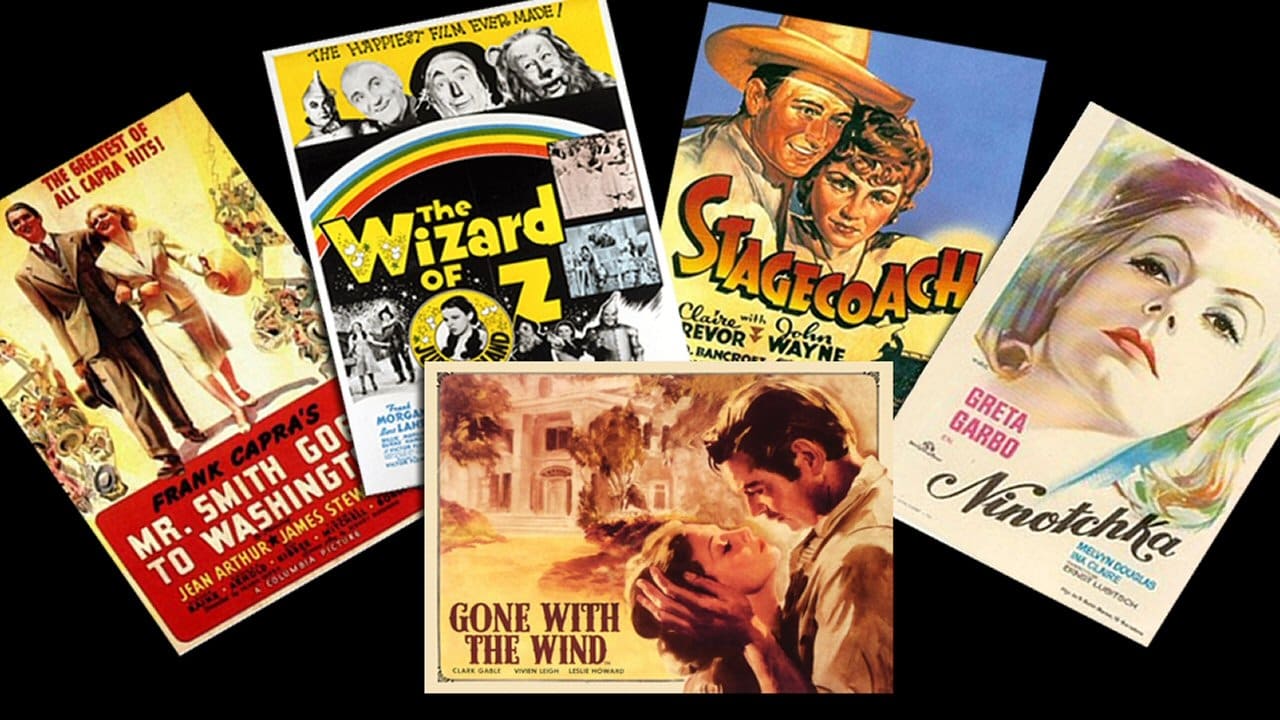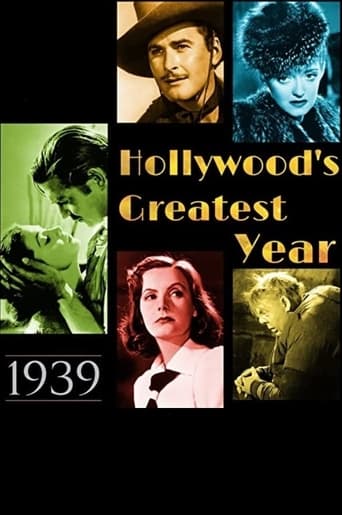

Stylish but barely mediocre overall
... View MoreIt is not only a funny movie, but it allows a great amount of joy for anyone who watches it.
... View MoreBy the time the dramatic fireworks start popping off, each one feels earned.
... View MoreThis is one of the best movies I’ve seen in a very long time. You have to go and see this on the big screen.
... View MoreIf you're a seasoned classic film fan or film history buff, then this documentary of Hollywood in 1939 will offer no new insights or information.I was surprised at how many films were glossed over or only briefly examined: Wuthering Heights, Intermezzo: A Love Story, Son of Frankenstein, and The Rains Came are all worthy of attention, yet all are barely given a paragraph. It's sad. As important as The Wizard of Oz and Gone with the Wind are, can't other films from that year get some love for once? There's nothing overtly awful or revisionist about this documentary, but it's nothing special. Only newcomers to classic film will find anything of interest here.
... View MoreI was expecting so much more from this profile of Hollywood's greatest year. I was very disappointed that this look at 1939 was so thin and so poorly done.I expected a lot of time to be spent on The Wizard of Oz and Gone With The Wind. I didn't expect this time to be at the expense of other '39 movies. This documentary of 1939 barely glossed over Idiot's Delight (Clark Gable's only appearance singing and dancing) and totally ignored The Little Princess, Bachelor Mother, Stanley and Livingstone, and Intermezzo: A Love Story (just to name a few).I was particularly disappointed that they left out Intermezzo because this would have provided a perfect time to contrast Leslie Howard with his role in Gone With The Wind (he was much too old to play Ashley Wilkes and I feel that showed in his performance, but he was wonderful in Intermezzo). The exclusion of Intermezzo is all the more puzzling because it was the first American film appearance of Ingrid Bergman. How can the debut of such a star be overlooked?Even the attention given to Gone With The Wind is weak. No mention is made of Hattie McDaniel's historic Oscar win (except for a one second moment of footage at the awards). The core audience for this film would have to be newcomers to classic movies. Any fan of classic movies will not learn anything new and will be horribly distracted by all of the omissions.The 70th anniversary of Hollywood's greatest year deserves better.
... View MoreA barely adequate look at the golden year of 1939, concentrating, as usual, on films owned by TCM and ignoring films they don't own and studios whose libraries they don't have.Turner not only does this in its documentaries but also in their books.I certainly can understand them wanting to push the stars and films they own, but please don't call this film history. Though TCM was not listed as the producer, they in fact were - they farmed it out to New Wave Entertainment, which has made many of their documentaries.Most slighted, as usual, was 20th Century Fox - I'll say this, they did mention it. Usually they leave it out all together. Tyrone Power in 1939 was one of the most popular stars in the world, in the top 10 box office stars - lucky him, they mentioned him once. Amazing.The documentary said that Gone with the Wind "swept" the Oscars, failing to mention that "The Rains Came" beat it - and the Wizard of Oz - in special effects.As usual, people watching this walk away believing the only stars were Clark Gable, Greta Garbo, Mickey Rooney, Bette Davis, Errol Flynn, etc. and the rest of them were people who did some acting on the side. After all, if you weren't with MGM, Warners, or RKO, you were nobody.
... View MoreNarrated by KENNETH BRANAGH, I'd give this one even higher points if the narration included even more key points when discussing actors like Errol Flynn. Scant mention is made of his famous co-star Olivia de Havilland and certainly the fact that they became a great screen team after their first film in 1935 (CAPTAIN BLOOD). Instead we get a brief glimpse of Olivia (a covered wagon close-up from DODGE CITY) and one brief scene arguing with Flynn. Anyone would think their screen team magic in eight films wasn't worth a mention. Indeed, all of his best films were with Olivia at his side.I could mention a few other omissions, but you get the drift. As always in these sort of tributes to studios and stars, there are some that really needed to be pointed out. Spending so much time on STAGECOACH when honoring John Ford westerns without a single scene from his other '39 masterpiece, DRUMS ALONG THE MOHAWK, is an oversight hard to forgive--especially since the narration mentions the stunning new use in '39 of a little thing called Technicolor.The films and stars that get the most attention are NINOTCHKA (because of Garbo), the Bette Davis era at Warner Brothers, the Cagney/Raft gangster films, and the most unusual Warner melodrama that dealt with the Nazis--CONFESSIONS OF A NAZI SPY.At Paramount, we get brief mention of Cecil B. DeMille and Claudette Colbert.At Fox, it's Darryl F. Zanuck and director John Ford's talent for making westerns but still no mention of DRUMS ALONG THE MOHAWK. Instead, it's the Tyrone Power film JESSE JAMES that's called the most popular western of the year and given the full Technicolor treatment.Then a brief look at United Artists which was formed back in the '30s by icons like Chaplin, Fairbanks and Pickford--and how independent producers like Walter Wanger and Hal Roach found a niche and made some great films. A clip from OF MICE AND MEN shows a tense scene between Lon Chaney, Jr. and Betty Field.At RKO, it's GUNGA DIN directed by George Stevens that cost the most to make and proved highly successful at the box-office. The other biggie is THE HUNCHBACK OF NOTRE DAME and Maureen O'Hara tells how awestruck she was by the masterful sets recreated entirely on a sound stage. The narration mentions that both of these films had underlying significance for audiences at that time--freedom from oppression being the theme in a world on the brink of war.A brief clip of Fred and Ginger from THE STORY OF VERNON AND IRENE CASTLE, and a love scene from LOVE AFFAIR are shown for the conclusion of the RKO segment.Then it's on to Selznick's independent feature GONE WITH THE WIND and all the obstacles in the producer's path before the film was finally made and declared an outstanding success.As noted before, it's the omissions that will grate on some people--but all in all a good treatment of Hollywood's most incredibly creative year under the studio system.
... View More